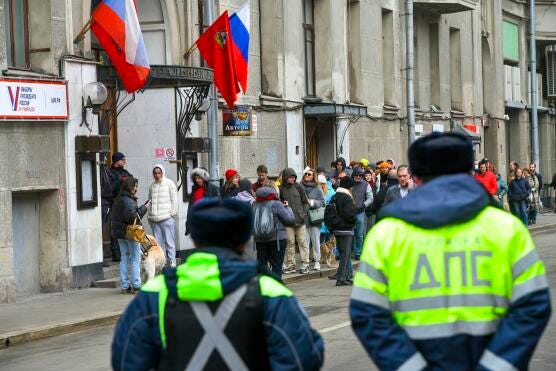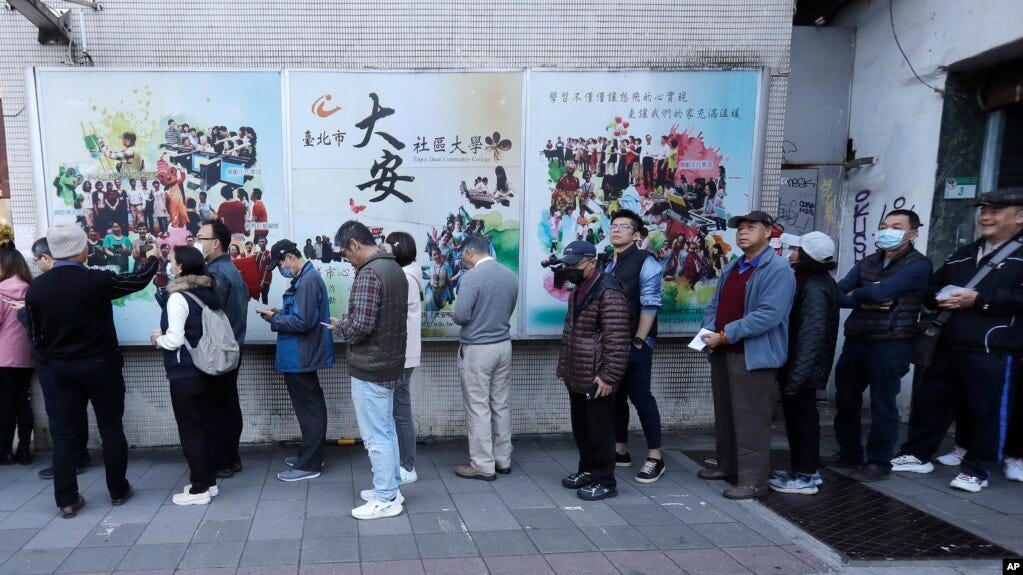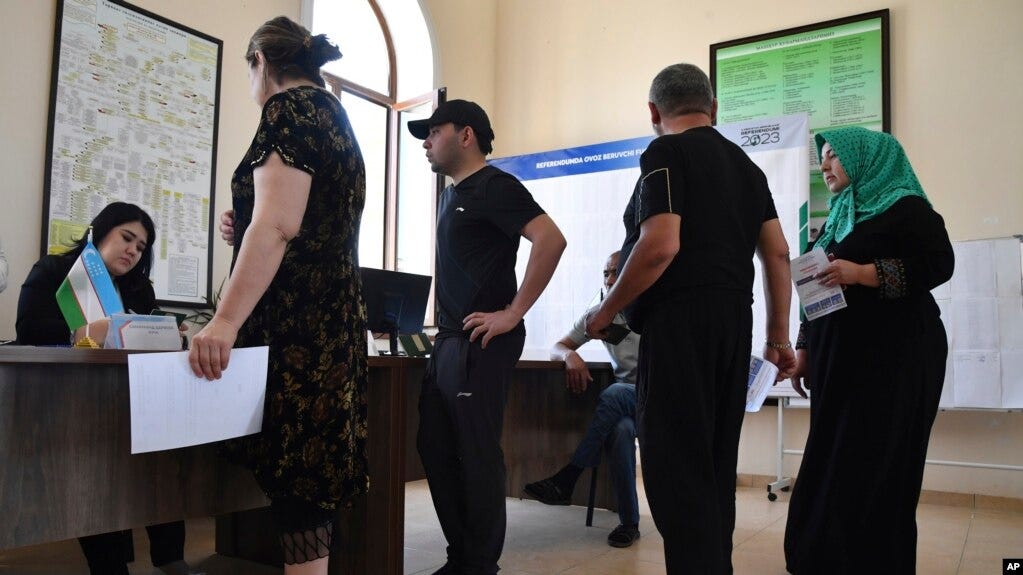E.Rowell: The globalists currently in charge of the US want continuous war. They are turning the US into a totalitarian terror state in which public statements that oppose the government’s narrative can get you a 6 am visit by a SWAT team of FBI and an imprisonment in a gulag. They constantly deride Putin as a dictator. But they are the ones sowing cultural chaos, division, and fear, in the US. They sow wars all over the world, yet they maintain they are the ones “saving democracy.” They have managed to take a country with a Constitution and free elections and turn it into a totalitarian country in which the governing elites always win elections by fraud.
Putin Emerges Stronger than Ever
By Stephen Bryen, WEAPONS AND STRATEGY 18 March 2024

Russians line up to vote
Ukraine’s attempt to interfere in Russia’s Presidential election has backfired. Putin’s internal support is stronger than ever. The geniuses in NATO and in US intelligence simply failed to understand Russia or the Russian election system.
I was a Presidential election observer in two countries: Uzbekistan and Taiwan. They are as different as night and day. The contrast is important now that Russia has completed its presidential election.
Taiwan is a vigorous democracy. Moreover, so far as I could determine, Taiwan’s election process is scrupulously honest. There are three major political parties and plenty of debate. I spoke to candidates at the national and local level around the country, visited polling places (many of them in schools), and attended party rallies. I listened to explanations from the major candidates expounding on their policies and agenda.
 Taiwanese people line up to vote outside a polling station in Taipei, Jan. 13, 2024. VOA
Taiwanese people line up to vote outside a polling station in Taipei, Jan. 13, 2024. VOA
Unlike Taiwan, Uzbekistan is not really a democratic country, but it does hold elections. The form of the voting process is first class. Like Taiwan, many of the polling stations are in schools. Votes are honestly counted. But the problem is, unlike Taiwan, there is only one real candidate. The real candidate runs against a token opponent, and everyone understands how it works.
 Lining up to get ballots at polling station, Uzbekistan VOA
Lining up to get ballots at polling station, Uzbekistan VOA
In fact, I attended a luncheon after the election where the “results” were announced. The opposition candidate, who received only a tiny vote, apologized for running in the election, saying he only did it so there was a second candidate for President.
While in Taiwan I could visit with the candidates, in Uzbekistan that was not permitted.
So what is the point of running an election if the outcome is foreordained? Is it to fool the outside world? Is it to somehow tell the people of the country that there is some sort of democratic process?
The issue was on my mind in Uzbekistan. I met many people, including young and dynamic reporters, one of whom was very popular. She ran a radio call-in talk show where people raised various issues and other callers would comment, as would she. These programs dealt with social issues, not political in the usual sense. “My boyfriend walked out on me. My rent is too high. My car broke down because of bad roads.”
She was very positive about the election. It was hard for me to understand.
When I visited a polling place in central Tashkent, a pleasant elementary school sited on a small park, everything seemed normal. People showed up, got their ballot, voted, and the voting was secret and protected. There were local election observers and the process looked fair and clean. I spent probably half an hour watching the process. I met the election workers, who were very happy to have visitors from “outside.” Then I went outside to head back to my hotel. As I walked through the park, an elegant older woman appeared, waving her arms. She wanted to talk to an election observer. Happily, I had a translator with me.
In clear language she told me not to be confused about the meaning of the election. It was not about picking the best man. Uzbeks already knew who the best man was and they would vote for him. The election, she said, was about demonstrating backing for the best man, and about voting for stability. “We want a leader here in Uzbekistan like Putin in Russia.” she said. “We need a strong leader. In this country we have terrorist threats and we want that stopped. We want to build our country and make it a showcase for the world. Democracy here is not like in the United States. Democracy here is to show our respect and support for our leader.”
I don’t know if she was a government plant, that was possible. But even if she was, her message was undeniably clear. (Afterwards, I thought her pitch was too clever for government-run propaganda.)
The American and European press is full of nasty characterizations of the Russian election, calling it a sham and a fraud, and spewing out the usual arguments about the suppression of the Russian opposition and the “resistance” to the vote in Russia.
There is no doubt that the opposition in Russia is suppressed. Russians don’t have political freedom as such.
Russian elections, like the Uzbek ones, serve a different purpose than to have candidates actually compete and offer different approaches to leadership.
Obviously the Russian elections were not democratic in the normal meaning of the term. The elections have a democratic form. In all there were four candidates (outdoing their Uzbek counterparts). None of the others received more than 4.31% .
The real vote was about Putin and his leadership.
Millions of Russians voted. The Ukrainians were so concerned about the election that Ukraine mounted a suicidal invasion force to try and stop voting in the Russian areas bordering on Ukraine, especially the Belgorod city and region. Over the three days of the Ukrainian operation, Ukraine killed 11 civilians using drones and rockets and injured another 82, including nine critically. One election official counted among the dead, as did a thirteen year old girl (her father was seriously injured when their car was hit by a drone strike).
Ukraine launched hundreds of drones fired at targets inside Russia, some aimed at Moscow and others at St. Petersburg, mainly at power plants and some airfields including Domodedovo in Moscow. Domodedovo, located south of Moscow, is the second busiest airport in Russia after Moscow’s main international terminal, Sheremetyevo.
The Ukrainians assembled a strike force that included around 1,500 Russian speakers in a special unit, a large number of foreign fighters, plenty of tanks and armored personnel carriers (including Bradley Infantry Fighting Vehicles), and shock troops from elite Ukrainian units. Over four days they consistently failed to capture any territory or even a small village. It was so bad that Ukraine’s head of military intelligence, Kyrylo Budanov told Vlodomyr Zelensky, Ukraine’s president, that the planning of their operation was compromised by a traitor, or so he believed.
 U.S. Ambassador to Ukraine Bridget Brink (left) and Acting Deputy Secretary of State Victoria Nuland, January 31, 2024
U.S. Ambassador to Ukraine Bridget Brink (left) and Acting Deputy Secretary of State Victoria Nuland, January 31, 2024
Budanov possibly planned the operation with Victoria Nuland, and this could have been the “surprise” she mentioned when she hurriedly visited Kiev at the end of January. She resigned or was fired on March 7th.
On March 18 the Russians targeted a meeting of senior Ukrainian security and defense commanders. At the time of this writing, very little is known other than the Russians believe that many were wounded or killed. It was part of Russia’s response to the Ukrainian invasion of Russian territory.
The Ukrainian operation was aimed at weakening support for Putin and disrupting the election in Russia. Why bother if the election outcome was predetermined? Why sacrifice countless lives?
We do not know why the Ukrainian leaders and their backers in NATO thought that an invasion would work and somehow the Russian elections would be discredited. This was altogether a fantasy.
The Russian election was not affected in any significant measurable way. Putin won with 87.28% of the vote. The turnout for the election was 74% of eligible voters. Altogether, more than 75 million Russians voted. The Russian press said the result was “historic.”
The Russian vote was an endorsement of Putin and for the “Special Military Operation” in Ukraine. Had his support fallen below 70% he could have had a problem, but it never surfaced.
Zelensky and his NATO backers again got it wrong when it came to regime change in Russia. If anything, the attempts to overthrow Putin and trash the Russian elections backfired and strengthened the Russian leader.



I found this to be one of Bryen’s better pieces. He provides a profoundly different view of democracy from eastern Europe.
In any event, the Ukrainians, instead of demonstrating how weak and incompetent Putin was on the eve of his reelection, they only showed their own ability to exceed expectations of their inept skill at war and defense at nearly the same moment. Like the recent Ukrainian disaster at sea, they pursued a pointless ruse which had no hope to do more than to gain a headline, only to gain a terrible slaughter instead. It does seem that the Ukrainians are impervious to any level of slaughter for a govt which thinks so little of its people that they expense their lives for passing headlines, and as of late, even this they fail to achieve any victory. Quite sad, and quite tragic. I dare say that while the Russian opposition is growing weaker, the Ukrainian opposition is likely to be growing stronger.